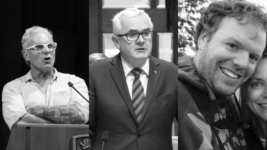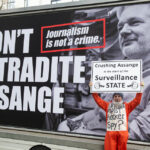Bipartisan Persecution of McBride and Boyle Continues

Independent for Clark Andrew Wilkie raised a motion in the Australian House of Representatives on 6 September, calling on the government to use the power it has to “discontinue the politically-motivated prosecutions” of whistleblowers David McBride and Richard Boyle.
Heralded as heroes amongst the public, McBride and Boyle continue to be doggedly pursued by the Albanese government, as was the case with the Morrison administration before it.
Indeed, these political prosecutions are designed not only to punish the pair but to deter others from exposing government corruption.
Attorney general Mark Dreyfus promised whistleblower reform on being re-elected to the office of chief lawmaker whilst in opposition, and these statements coincided with the outrage that was building over these prosecutions, along with a third that involved ACT barrister Bernard Collaery.
Wilkie suggested to the chamber last Wednesday that the merit of his motion was “self-evident”, as the two men, rather than having committed any heinous crimes, had exposed corruption in the public sector: McBride revealed war crimes, whilst Boyle uncovered an unlawful tax office practice.
But after a number of independents rose to speak in support of it, the motion was put to the lower house and overwhelmingly voted down by both majors, revealing that Labor is just as concerned as the Coalition about making an example of these men to aid in silencing future would be disclosers.
“Unjust, as far as they go”
On raising the motion, Wilkie cited the words current PM Anthony Albanese said in relation to the Collaery case early last year, as the then opposition leader had said, “The idea that there should be a prosecution of a whistleblower for what’s a shameful part of Australian history is simply wrong.”
“I read that and think about Mr McBride, the whistleblower who shone a light on the alleged war crimes in Afghanistan. That he should be facing prosecution is simply wrong,” Wilkie maintained. “That Mr Boyle is facing prosecution is simply wrong.”
McBride is facing five national security offences in relation to leaked classified documents revealing Australian war crimes perpetrated in Afghanistan, whilst Boyle faces 24 criminal charges regarding measures taken to gather evidence that the tax office was unlawfully accessing citizens’ accounts.
Dreyfus continues to state that “the government is delivering on its commitment to ensure that Australia has effective frameworks to protect whistleblowers”. And while he began amending the law last year, he only did so, after McBride and Boyle had attempted to apply it in defence.
“I do feel that the government and the attorney general are failing us when it comes to not dropping the charges against David McBride and Richard Boyle,” Wilkie further said. And he added that while the AG insists he can only intervene in “exceptional cases”, these prosecutions are the exception.
Justice denied
Section 71 of the Judiciary Act 1903 (Cth) permits the federal attorney general to intervene in a prosecution and bring it to an end prior to case finalisation. But Dreyfus’ only under “exceptional circumstances” reading of this law is his own interpretation.
Dreyfus did apply the section 71 power to the prosecution of Bernard Collaery in July last year.
One obvious distinction between the three cases is that Collaery was fighting suppression orders placed on his case and was on his way to exposing six hidden matters publicly via court order, which would have proven embarrassing for high level figures, as well as to the government as a whole.
The Public Interest Disclosure Act 2013 (Cth) (PID Act) is the federal legislation that’s supposed to protect those in the public sector who expose corrupt government practices. However, the 2016 Moss inquiry report into the Act found it to be convoluted and full of holes.
Dreyfus actually drafted these laws and oversaw their enactment a decade ago, during his previous stint as chief lawmaker. And the current attorney general admitted in October 2021 that he was aware that the laws were lacking on enactment, and he planned to fix this if elected to office again.
The talk of reforming the PID Act prior to the last election had been taken as a prospect that all three high-profile cases might be ended on federal Labor taking office. But instead, only Collaery was saved, and the two other men were made to attempt to defend themselves under pre-amended law.
As Dreyfus told the chamber on the day prior to Wilkie’s motion, and in response to questioning from the Independent for Clark, he’s ensured that priority PID amendments were enacted in June, and a public consultation process regarding an entire overhaul of the PID Act is on its way.
Punishing the truth-teller
Both McBride and Boyle blew the whistle on the understanding that there were public interest disclosure laws in place that would serve to protect them. And both men are now facing charges that could see them spend the rest of their lives behind bars for revealing wrongdoing in public interest.
Boyle argued his PID defence last October. Yet, the laws were found not provide him with immunity regarding the measures he took to gather his evidence to build his case. And this is despite the Australian Tax Office having brought an end to the unlawful garnishee practice he exposed.
The former ATO officer launched an appeal of this decision last month, and the outcome is yet to have been announced.
In terms of McBride’s PID defence, he was served another stark injustice when fronting up to court to argue it.
The former ADF lawyer arrived already aware that the prosecution was set to challenge whether his only two witnesses could testify, but then further, a public interest immunity order had been placed on the case which meant the prosecution could remove any of his evidence.
So, faced with this, McBride’s defence team had little choice but to pull the plug on the PID proceedings, and the man who served two tours as a legal officer in Afghanistan on behalf of the country is set to stand trial commencing 13 November.
And as these circumstances continue to reveal, the authoritarian creep that was gaining pace under a decade of Coalition rule has not been brought to a halt with a change to Labor governance.
In fact, what’s becoming increasingly apparent is that the closure of open government and justice in this nation is a project being advanced by both major parties.







